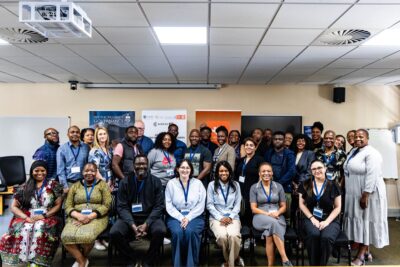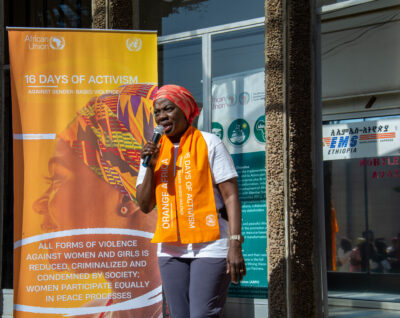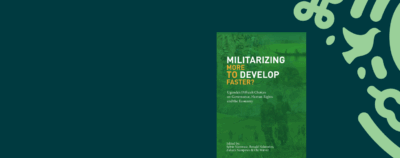The cityscape of Abuja, the capital of Nigeria, is dominated by two houses of worship known as the National Mosque and the National Church. Facing each other in the heart of the city, these impressive architectural monuments symbolize the crucial place of organized religion in the postcolonial Nigerian state’s efforts at forging a unified national public. The national population of 160 million is notoriously heterogeneous, comprising hundreds of languages, ethnicities, and so-called “traditional” religious and political institutions. For political and rhetorical expediency, this diversity is often reduced to the country’s 36 states, 6 geopolitical zones, and 3 majority languages (plus English). But the Muslim/Christian dichotomy is arguably the central organizing trope in contemporary discourses of Nigerian nationhood. Pastors and imams stand side-by-side to bless public events, newspapers juxtapose op-ed columns by Muslim and Christian authors, and tensions among the country’s various ethnic, linguistic, religious and regional communities are frequently reduced to the seemingly fundamental opposition between a predominantly Muslim North and largely Christian South—the mitigating adverbs only serving to highlight the rhetorical slippage involved. The visible centrality of a “national” church and mosque in the country’s planned capital city thus symbolically reinforces the Christian/Muslim divide that the Nigerian state is constantly struggling to overcome.
The geo-sectarian rivalries that beset the Nigerian nation-state have roots in British colonial policies, and have been exacerbated in recent decades by the global circulation of Christian and Islamic missions and militancies. One sadly persistent locus of communal violence is the so-called “Middle Belt” region, which lies between the North and the South. (Abuja, the capital, is located in this region but is administratively distinct from the states that surround it.) Political and economic competition between predominantly Christian ethnic groups, many of whom are farmers, and the mainly Muslim Hausa and Fulani, who are largely traders and herdsmen, has simmered for decades with occasional eruptions, but lately the violence has become more frequent and vicious. In the press and through social media, stories and images circulate of arson and machete attacks that have decimated entire villages; one particularly gruesome meme features young Christian men from the state of Plateau bragging about having roasted and eaten the flesh of murdered Muslim villagers. Despite its religious framing, numerous commentators have pointed out that the Middle Belt conflicts are not about religion per se. They are about herders and farmers competing over land. They are also about the politics of ethnicity, for most Nigerian states—reproducing British colonial policies—grant full citizenship rights only to “indigenes” who can trace their local ancestry back several generations. In the case of Plateau and other Middle Belt states, this policy generally includes the ethnic groups that practice farming, but it disenfranchises Fulani and Hausa who are deemed “settlers” even if their ancestors migrated to the region three generations ago. Nevertheless, news reports and quotidian discourses among Nigerians routinely characterize clashes in the Middle Belt in terms of Christians vs. Muslims.
Even more than the Middle Belt conflicts, international news reports from Nigeria have focused heavily on the Islamist militant group known colloquially as Boko Haram, which in Hausa, the lingua franca of northern Nigeria, means “Western education is Islamically forbidden.” From its base in the country’s northeast, and with rumored connections to Al Qaeda, Boko Haram has bombed churches full of worshippers and attacked police stations and other public agencies as part of a rather fuzzily articulated campaign against the federal government. Its ostensible goal is the nationwide adoption of sharia, Islamic law (currently official only in 12 northern Muslim-majority states), but its practical aim seems to be to provoke conflict between Muslims, on one hand, and Christians and the federal government, on the other. The latter conflation is made possible by the fact that Nigeria has had a (southern) Christian President for 12 of the last 15 years. (The current president, Goodluck Jonathan, is an Anglican from the South-South geopolitical zone.) Boko Haram has also attacked Muslim clerics who have publicly criticized it, but these attacks initially attracted less media attention—an oversight lamented by many Muslims who insist that such wanton killers cannot be true followers of Islam. In early 2014, however, a prominent Salafi cleric, Sheikh Muhammad Awwal Albani, was assassinated with his wife and child while returning from mosque in the northern city of Zaria. This spectacular attack, coupled with assaults on government schools in which students were murdered regardless of religious affiliation, has fortified Muslim opposition to Boko Haram and fueled speculation that many of the group’s members are not Nigerian at all, but foreigners who entered the country from neighboring states.
Against this tragic background, a positive note in Muslim-Christian relations was struck in late 2012 when two of Nigeria’s leading clerics—Alhaji Muhammad Sa’ad Abubakar, the Sultan of Sokoto, and Reverend John Onaiyekan, the Roman Catholic Archbishop of Abuja—were nominated for the Nobel Peace Prize. In considering their nomination, the prize committee presumably sought to encourage religious tolerance and pluralism in Nigeria and any country affected by Christian-Muslim tensions (including, one imagines, the committee’s home country of Norway). Many Nigerians shared that sense of hopeful ecumenism, but they also took pride in the nomination for a more prosaic reason: they were relieved to see Nigeria being represented positively (for once!) on the global stage. A similar sense of pride was expressed by Nigerians of diverse persuasions when the Vatican elevated Onaiyekan to the rank of cardinal later that same year. These positive images stand in stark contrast to Nigeria’s widespread reputation for fraud, corruption, drug-running, and communal violence. Nigerians acknowledge and complain about these problems constantly, but they are understandably defensive when they see such images, and no others, circulate among people who know nothing else about their country. The effects of these negative representations are not only symbolic, but practical, insofar as they impede Nigerians’ ability to travel, find work and other accommodations outside their country—and even within it, such as when Nigerians deal with international employers and other gatekeepers.
Nigerians’ sensitivity to the perils of traveling-while-Nigerian was piqued in September 2013 when hundreds of Muslim Nigerian women who had flown to Saudi Arabia to perform the hajj were detained at the airport in Jiddah because, officials claimed, they lacked a suitable male companion. Despite diplomatic wrangling and indignant protests from Abubakar and Jonathan, the would-be pilgrims were deported back to Nigeria and only allowed to return to Saudi Arabia when they could certify proper male companionship. Most Nigerian commentary about the deportations insisted the women had done no wrong; the groups they were traveling with had been organized by Nigerian state authorities, which served as their de facto guardians. Implicit in much public discourse was a sense of indignation that the Saudis had effectively questioned the sexual honor of almost one thousand Nigerian women. This accusation was made explicit when Sheikh Ahmad Mahmoud Gumi, a Salafi reformist and frequent critic of the Nigerian government, placed the blame for the deportations on “the atrocities committed by our female pilgrims in Saudi Arabia,” who “stay there to engage in acts that are not only against our religion but against even common sense and morality.” Further complicating matters, Gumi’s accusations echoed stories about southern Nigerian women who travel to Italy, a place of pilgrimage for Nigerian Catholics, only to work as prostitutes. The accusations also inverted the rumors that circulate among some Nigerian Muslims about the lasciviousness of Saudi men and the ways they objectify and harass African women and feminine men.
The different public reactions of Gumi and Abubakar highlight tensions among Nigeria’s Muslim leaders over the proper relationship between Islam and the Nigerian state. Boko Haram’s violence makes it easy to dismiss its antigovernment ideology as an extremist outlier, but Gumi has respectable credentials. His father, Sheikh Abubakar Gumi, helped found the largest Salafi organization in Nigeria today, known as Izala, and helped pave the way for the eventual adoption of sharia by the governments of 12 northern Nigerian states. Ahmad Gumi’s fiery tongue has gotten him into trouble with authorities, but he has condemned Boko Haram and remains inside the sphere of public respectability. As such, his accusatory comments about Nigerian female pilgrims’ “atrocities” and “indiscipline” carry weight and are likely to make mainstream Muslim leaders uncomfortable, for they underscore a stereotype of orthodox Islam as androcentric and oppressive of women. Mainstream Muslims often try to live down that stereotype, which in Nigeria tends to be circulated by Christians who see their faith in competition with Islam.
In responding to the Nobel Peace Prize nominations, the elevation of Cardinal Onaiyekan, and the deportation of the Muslim women pilgrims, many Nigerians were motivated as much by national pride—by their sense of themselves as Nigerians—as they were by religious sentiments. Muslims and non-Catholic Christians congratulated the new cardinal, while Christian leaders, including President Jonathan, spoke out to defend the honor of Nigeria’s Muslim women. A similar sense of ecumenical solidarity is apparent in Nigerian public discourses about homosexuality. After President Jonathan signed the Same Sex Marriage (Prohibition) Act in December 2013, for example, Muslim and Christian spokesmen alike praised the government for defending the country’s “traditional” moral values. Yet Nigerians’ apparent unanimity with respect to gay rights is not absolute. A close analysis of Muslim and Christian leaders’ pronouncements on the topic reveals instructive rhetorical differences. In particular, whereas Christian leaders are apt to condemn homosexuality as “un-African,” their Muslim counterparts typically speak more vaguely of shared moral values without clearly specifying an ethnic or racial referent. These subtle differences index divergent ideological stances with respect to a putative “African” sexual culture, as well as historical tensions within and between Christianity and Islam in Nigeria.
The claim that homosexuality is “un-African” is widely understood as marking resistance to the neocolonial imposition of liberal Western values. Yet one of the leading proponents of this claim, Nigeria’s former Anglican Primate Peter Akinola, has explained that his vocal opposition to homosexuality was motivated not by anticolonial fervor, but by the competitive threat of Islam. If the Anglican Church were perceived to be condoning homosexuality, the archbishop risked losing his flock to other Christian churches or, even worse, to Islam. Far from renouncing the legacy of colonialism, Akinola and other Nigerian Christians view the acceptance of homosexuality by liberal Western churches as a betrayal of the values taught by the missionaries. This sense of betrayal is heightened by Christians’ sensitivity to accusations from cultural nationalists that they have forsaken authentically African traditions.
Islamic partisans reproduce a version of this discourse by painting virtually any Nigerian Christian or secularist, or any Muslim who deviates from the orthodox Islamic path, as an “imitator” of the West. This version does not appeal to ostensibly indigenous African traditions, however, for such traditions, like the Hausa practice of spirit-possession known as bori, are typically derided as “pagan.” Indeed, many northern Nigerian Muslims respect “traditional” customs only insofar as these do not conflict with normative Islam. Accordingly, when the leader of northern Nigeria’s Sharia Council condemned gay rights as an “erosion of our accepted principles of morality,” he could be heard as voicing solidarity with his antigay Christian peers without endorsing the latter’s appeal to “the African way of life.” Appeals to cultural, as opposed to religious, traditions about sex are especially problematic for Muslim northerners, who are widely rumored among other Nigerians to have a predilection for homosexuality.
Notwithstanding their internal contradictions, the convergence of Nigerian Muslim and Christian discourses with respect to homosexuality offers evidence of a certain degree of interreligious cooperation. Like the solidarity Nigerians express in other contexts—including football (soccer)—antigay solidarity seems motivated by a common desire to defend Nigeria’s image in the wider world. In this case, as in the case of the deported Muslim pilgrims, there is a shared commitment to defending Nigerians’ sexual honor in terms that are redolent of colonial morality. The cost of this solidarity is borne by Nigerian lesbians, gay men, sex workers, and other sexual minorities who are effectively excluded from the body politic.
A selective kind of religious solidarity is also apparent in efforts to market Nigerian cultural festivals. A 2012 newspaper article described the economic value of such festivals as follows:
NIGERIA is blessed with abundant resources and cultural festivals that reflect the country’s diverse cultures and rich heritage… Eyo festival, Calabar Christmas Festival, Argungu Fishing Festival, Durbar, New Yam, Osun Osogbo, to mention a few. There is no gainsaying that these cultural festivals, if properly harnessed can pull in imaginable revenue for the country and enhance tourism…
Though described as “cultural,” five of the festivals listed have an explicitly religious dimension: apart from the Christmas festival, Durbar celebrations are held throughout northern Nigeria to mark the Muslim holiday of Eid al-Kabir, Eyo and Osun Osogbo honor Yoruba deities, and the New Yam festival involves Igbo practices of spirit-worship. Only the Argungu Fishing Festival is arguably secular; it commemorates the end of hostilities between two kingdoms in northwestern Nigeria that were at odds for much of the nineteenth century. Though not explicitly religious, the occasion of peace-making between the two kingdoms, both of which were Islamic, recalls the legacy of the Sokoto Caliphate, the preeminent polity in what became northern Nigeria, which remains a focus of northern Muslim loyalty and pride. (The current Sultan of Sokoto, Sa’ad Abubakar, is a successor of the Caliphate’s founder, Shehu Usman dan Fodio.) Commodifying religious occasions as “cultural festivals” has secularizing effects, but those effects are not equal; secularization weighs especially heavily on “traditional” religious institutions, i.e., those historically deemed “pagan” by orthodox Christians and Muslims. Traditional religious practitioners and events may be officially acknowledged as part of Nigeria’s cultural heritage, but they are rarely accorded the status of religion in practice. Nigerian traditionalists have not suffered from purges, such as those that occurred in post-independence Guinea. Traditional religious leaders are not asked to bless public events, at least at the national level, and there are no columns devoted to traditional religious discourse in national newspapers. Christmas and Eid al-Kabir are celebrated as Nigerian national holidays; traditional religious celebrations are not.
As scholars have long noted, the transnational character of Islam and Christianity is complemented, and complicated, by their embeddedness in local institutions and social networks. Accordingly, while some discourses portray sectarian loyalties as foreign and hostile to the (always apparently fledgling) Nigerian nation-state, others mobilize Islam and Christianity in service to the nation. For all their internal diversity and mutual rivalry, Christianity and Islam offer many Nigerians a kind of transnational citizenship that complements and even reinforces national belonging—a sense of oneself as Nigerian. Traditional religions, by contrast, are largely regarded as “local” phenomena, a term that, in Nigerian usage, connotes both geographical and historical remoteness. This is so even though some traditional religions, notably Yoruba, have long been transnational and are becoming increasingly so. State patronage offers benefits to certain Muslim and Christian institutions; in turn, Christian-Muslim rapprochements are enacted to benefit the nation-state. Yet these benefits come at the cost of marginalizing numerous communities, institutions and practices, including some that represent Nigeria’s oldest moral, intellectual and religious traditions.













